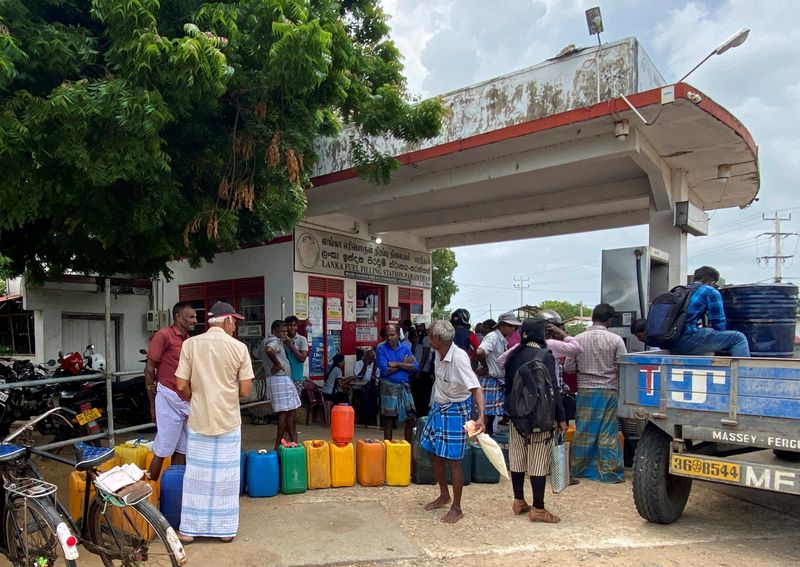By Uditha Jayasinghe and Swati Bhat
COLOMBO (Reuters) -Sri Lanka's central bank held rates steady on Thursday and the governor sounded a note of cautious optimism about the damaged economy, saying foreign exchange reserves were on the mend and runaway inflation could peak as early as September.
Still, the economy is likely to contract 8% this year and growth is not likely until the second half of 2023, Nandalal Weerasinghe said at a news conference.
"The monetary board looked at lower global prices, a slower pace of inflation and moderating growth as key reasons for keeping rates unchanged," the central bank chief said.
"We are also looking forward to fresh policies in the interim budget and confidence that will come from an IMF programme to assist with stability over the next few months."
The country is due to restart bailout talks with the International Monetary Fund (IMF) in August in the hope of securing $3 billion in funding.
The central bank kept the Standing Lending Facility rate at 15.50% while the Standing Deposit Facility Rate remained at 14.50% as predicted.
The central bank has raised rates by a record 950 basis points so far this year to battle inflation in Sri Lanka, which has been hit by its worst economic crisis since independence in 1948.
A foreign exchange shortage had left the government struggling to pay for essential imports but Weerasinghe said the country now had adequate reserves for importing food, fuel and medicine.
Inflation hit 60.8% year-on-year in July and food costs expanded by a searing 90.9%, according to latest government data, although the rate of the increase is falling.
"Even though the pace is reducing we will see inflation at 50% for the rest of the year. Inflation is expected to hit single digits only in mid-2023," said Dimantha Mathew, head of research at First Capital.
Weerasinghe said inflation was projected to peak in September "at 60%-65% and then start to trend down."
A central bank statement said the measures taken by it and the government so far would help contain aggregate demand pressures while an anticipated decline in global commodity prices would pass through to domestic prices.
Colombo's main stock index ended flat on Thursday after earlier rising as much as 1.2% during the session. The index is up 15.3% in August on optimism that the worst of the crisis is over, but is still down 27% on the year.
"Given the dynamic crisis situation, going ahead it will be important to see if these initial signs of stabilisation continue in the positive direction the CBSL foresees, supported by progress on the IMF and debt restructuring negotiations," said Thilina Panduwawala, head of research at Frontier Research.
FOCUS SHIFTS TO IMF, BUDGET
The central bank said the impact of persistent supply side disruptions, primarily due to shortages of power and energy, and uncertainties associated with socio-political developments are expected to have caused "significant adverse effects" on economic growth in the second quarter.
Tens of thousands of people protesting against the economic crisis forced the ouster of the president, Gotabaya Rajapaksa, in July and he was replaced by Ranil Wickremesinghe.
The central bank said growth would remain subdued in the third quarter as well.
Investors are now awaiting the interim budget due to be presented to parliament next month for further direction.
The budget is expected to outline steps to curb the fiscal deficit, cut expenditure and bring in tighter control of state-owned companies, economists said.
Wickremesinghe has also hinted at bringing in policies to help Sri Lanka transform from debt-fueled development to becoming a competitive export-oriented economy, but has given few details.

Weerasinghe said an agreement with the IMF was likely to include a debt sustainability plan for the next 10 years.
"We hope all the creditors will be supporting Sri Lanka once they see the strong macro and structural reforms programme that we will present and will have the endorsement of the IMF. Once they see the credibility of the programme we expect relief to be given by all creditors," he added.